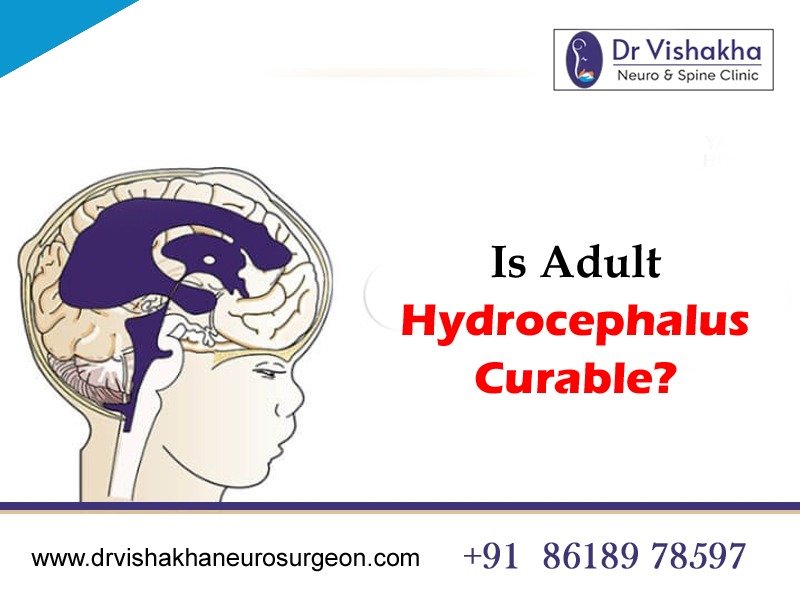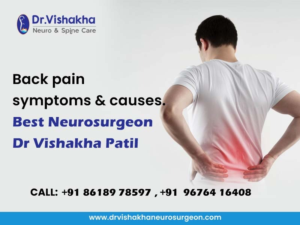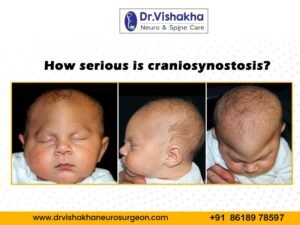With over 13 years of experience in treating neurological conditions in children, Dr. Vishakha Basavraj Karpe is a highly regarded pediatric neurosurgeon practicing in Hyderabad. As a Senior Consultant at Rainbow Children’s Hospital, she has performed over 3,000 neurosurgeries, including 1,500 pediatric cases. Her expertise covers a wide range of conditions, including hydrocephalus, spinal dysraphism, pediatric brain tumours, craniosynostosis, and traumatic brain injuries. Dr. Karpe is known for her compassionate care and commitment to educating parents about neurological conditions affecting children. Her current role at Rainbow Children’s Hospitals positions her at the forefront of specialized child neurosurgical care. Dr. Vishakha’s tips for parents whose children are diagnosed with neurological conditions requiring surgical intervention are highlighted.
Dr. Vishakha emphasizes the importance of early detection in chdren, highlighting signs such as developmental delays, abnormal head shapes, frequent vomiting, seizures, or milestone loss as potential neurological issues. Early diagnosis, often through clinical examination and imaging, allows for timely and effective treatment.

Empowering Parents: Insights from Dr. Vishakha Karpe
- Early diagnosis is crucial for improving outcomes in conditions like hydrocephalus, craniosynostosis, spina bifida, and pediatric brain tumours. Identify abnormal head shape, developmental delays, seizures, or poor feeding in infants and consult a specialist immediately.
- Understanding your child’s neurological condition is key to making the best, most informed decisions. Ask detailed questions about diagnosis, surgical procedures, and recovery, and don’t hesitate to seek a second opinion if needed.
- Dr. Karpe encourages parents to be proactive in their child’s care journey by keeping track of appointments, pre-surgical tests, medications, and follow-up care and discussing every step of the treatment and postoperative plan with their medical team.
- Emotional support is crucial for children, even those who can sense stress and fear. Maintain calmness, use age-appropriate language, and create a comforting routine by bringing familiar items to the hospital.
- Postoperative recovery is crucial for optimal healing, and it’s essential to monitor for signs of infection, swelling, or behavioral changes, and attend all follow-up appointments and therapy sessions.
- Rehabilitation and therapy are crucial for neurological conditions, and following rehab recommendations is essential for improved developmental outcomes. For certain conditions, therapy that’s started early and followed consistently can yield results comparable to surgery.
- The journey of parenting a child with a medical condition often comes with significant emotional strain. Connect with other parents, support groups, or counsellors, and prioritize your mental health to support your child better.
- Dr Karpe emphasizes monitoring a child’s long-term development, even after recovery and suggests regular tracking and discussing concerns with pediatric specialists or neurologists.
Parents’ empowerment and emotional support are crucial for a healthy, happy life, as they can provide the necessary knowledge and resources for their child’s recovery.

What Parents Need to Do: Preparing for Craniosynostosis Surgery
Craniosynostosis is a condition in which the skull’s growth plates in an infant fuse prematurely, thereby influencing the brain’s ability to grow properly. Surgery is the recommended solution for correcting skull shape and supporting normal brain development.Parents are responsible for preparing their children for this procedure by following practical steps for physical, emotional, and logistical preparation. Parents should educate themselves about the procedure, consult with a pediatric neurosurgeon or craniofacial surgeon, and stay calm, positive, and supportive. For toddlers and older children, use simple language, read age-appropriate books, and encourage their child to express feelings through drawing or talking.
Parents should pack essentials for a hospital stay, arrange leave, and inform siblings about the situation. Follow preoperative instructions, including fasting guidelines, health check-ups, lab work, and scans to prevent complications. Plan for their child’s recovery at home, creating a safe and clean environment, following wound care and medication instructions, and keeping track of follow-up appointments.
Emotional support for parents is essential, as they may feel anxious about their child’s surgery. Connect with support groups, parents who have gone through the process, and counsellors or therapists if needed. When parents share their concerns and seek guidance, it helps them remain strong for their children.
As a dedicated pediatric neurosurgery specialist, Dr. Vishakha Karpe emphasizes key pillars for care: strong parent-doctor partnership, thorough education, vital emotional support, and ongoing long-term developmental care. Her approach is holistic, integrating surgical expertise with parental education and support. Her goal is to enhance treatment outcomes and ensure the well-being of her patients. By following her guidance, parents can feel empowered to make informed choices and support their child’s healing journey. Her insights serve as invaluable guidance for parents navigating the complexities of pediatric neurological conditions.
About Dr Vishakha :
Dr Vishakha Basavraj Karpe is a highly skilled senior consultant at Rainbow Children’s Hospital in Banjara Hills and Hydernagar Hyderabad. She is known for her comprehensive care approach and is one of the few dedicated leading paediatric neurosurgeons in the city and India with over ten years of extensive experience in pediatric neurosurgery. Her expertise includes treating hydrocephalus, spinal dysraphism, craniosynostosis, paediatric brain infections, brain and spine tumours and stroke surgery. She has a special interest in craniosynostosis surgery, which is done only in very few centres in India.
Proficiency of Dr Vishakha:
-
- Hydrocephalus (increased fluid in the brain): The procedure involves an endoscopic third ventriculostomy and CSF diversion (VP shunt) to treat complex hydrocephalus.
- Craniosynostosis (abnormal head shape due to untimely cranial sutures fusion) surgeries: Helmet therapy is a technique that is used in both endoscopic and open surgery.
- Spinal dysraphisms(Spina Bifida)- (spinal abnormalities present by birth) – surgical repair
- Encepahaocles repair surgery.
-
- Vascular conditions and stroke surgeries: revascularization surgeries for moya moya disease.
- Pediatric brain and spine tumour surgeries.
-
- Pediatric brain and spine infection surgeries: Endoscopic and open surgeries for brain and spine infections.
- Pediatric traumatic brain and spinal injury.
- Antenatal counselling for congenital fatal neurosurgical conditions.





